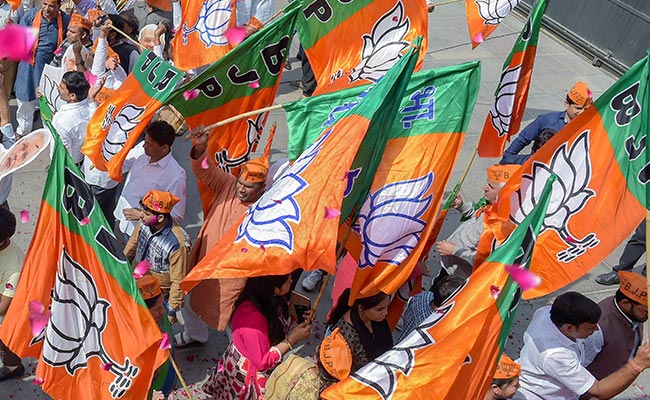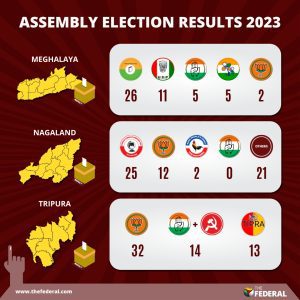
Poll verdict: BJP juggernaut rolls on in North-East, Congress decline continues

The BJP’s domination and Congress’ decline in the northeast was again reflected in the assembly elections results of three states.
The BJP made a spectacular turnaround to retain Tripura, bucking anti-incumbency, which had forced the party to replace its Chief Minister Biplab Kumar Deb with Manik Saha just a year ahead of elections. Of the damage control exercises Saha initiated after taking charge, the 12 per cent hike in dearness allowance and dearness relief his government announced for the state government employees and pensioners just a couple of months ahead of elections turned out to be a game changer. It directly benefited the state’s 1,04,600 regular employees and 80,800 pensioners.
Also read: Exit polls: Hung house in Meghalaya; advantage BJP in Tripura; NDPP in Nagaland
Change of guard, DA hike propel BJP
“In a small state like Tripura where the government is the main source of employment, such upward restructuring of salary has a far reaching impact. This has definitely influenced the voting choice of not only the state employees and pensioners but also their families,” pointed out Gautam Chakma, a political commentator from Tripura University. The comprehensive lead the BJP got in the postal ballots further reinforced Chakma’s argument. Salaries of Anganwadi, Aasha workers and state home guards were also hiked ahead of the elections.

Apart from it, the state had also witnessed a slew of development projects being either inaugurated or announced by Prime Minister Narendra Modi and other top Central leaders in the run up to the elections to counter the anti-incumbency wave that had started to set in.
On December 18, Modi launched several projects including a “Grih Pravesh” programme for more than two lakh beneficiaries of the Pradhan Mantri Awas Yojana. He followed it with another visit in January to announce more schemes including Mukhyamantri Gram Samridhi Yojana that aimed at holistic development of villages by providing electricity and tap water connections to every household.
“PM Modi and Union Home Minister Amit Shah started visiting the state even before the election schedules were announced. During the campaign, Modi held three rallies while Shah addressed four. Many other top Central BJP leaders virtually camped in the state,” senior journalist Sekhar Dutta said.
Also read: High turnout in Tripura polls; ruling BJP uncertain, Left-Congress alliance upbeat
Congress-Left alliance fails to make impact
The opposition’s campaign lacked that determination. Rahul Gandhi and other members of Gandhi family who are still considered as the most popular faces of the grand old party gave the campaign a miss.
The Congress-Left alliance failed to make much impact on the ground. The Congress’ votes did not transfer to the CPI (M) candidates in many of the constituencies.
“We will have to definitely introspect as to where we went wrong and find whether there was any organisational weakness,” said Congress leader Sudip Roy Barman after the disappointing performance of the alliance.
Tipra Motha factor helped BJP
The Tipra Motha factor also worked in the BJP’s favour. Apart from making a dent in the CPI (M)’s tribal vote, the nascent party of the scion of the state’s erstwhile royal family at least helped the saffron party win at least seven to eight non-tribal seats by splitting opposition votes. The Motha also ensured that the CPI (M) is almost wiped out of its erstwhile stronghold in the state’s tribal belt that accounts for 20 seats.
The Left party tried to win back support of the tribals by opting for Jiten Choudhury its chief ministerial candidate over its most popular face Manik Sarkar. However, the move seems to have boomeranged.
Only 14 candidates of the Congress-Left combine emerged victorious. The TMC, which had entered Tripura with much gung-ho too failed to make an impact. It did not even get one per cent of the total vote polled as it failed to rope in a popular face unlike Meghalaya where it got former chief minister Mukul Sangma to lead the party.
Also read: Nagaland: BJP-NDPP exude confidence even as Naga peace process remains in limbo
NDPP-BJP alliance retains Nagaland
The BJP is also certain to be part of the government in Nagaland where it has a pre-poll alliance with the NDPP, which has emerged as the single largest party with 25 seats. However, the BJP’s tally remained at 12, the same as the last time.
In Nagaland, the ruling alliance obviously benefitted from the absence of any strong opposition. Neither the NPF nor the Congress could field candidates even in half of the state’s 60 seats. The NPF has already sent feelers to be part of the new coalition government, an indication that Nagaland might once again see an “Opposition-less” government.
Women break glass ceiling
However, the big takeaway from Nagaland verdict is the people electing two women candidates —- NDPP’s Hekani Jakhalu from Dimapur III assembly constituency and Salhotuonuo Kruse from Western Angami seat. They are the first women to be elected to the Nagaland legislative assembly, a development that is expected to end political isolation of females in the state.
“This is a welcome change. Now more and more women will be encouraged to participate in electoral politics. This will only make the democracy more vibrant,” Naga Hoho president HK Zhimomi told The Federal. Naga Hoho is the apex tribal body of the state.
Also read: ‘We expected more,’ says Meghalaya CM Conrad Sangma; in talks with BJP
BJP reunites with Meghalaya ally
In Meghalaya where the five-decade old trend of not giving absolute majority to any party continued, the BJP has buried the hatchet with the NPP to be in the ruling coalition.
NPP leader and Meghalaya chief minister Conrad Sangma already had one round of talks with Assam Chief Minister Himanta Biswa Sarma, sources said. Sources in the NPP further stated that though in terms of numbers they may not need the support of the BJP, they would be too happy to include the saffron party in the government for obvious reasons. They said Sangma already had discussions with Shah after the results were announced and sought the BJP’s support to form the new government.
Another regional party, the UDP, which got 10 seats is ready to extend support to the NPP which fell just six seats short of the magic figure of 31.
During its election campaign, the BJP had said that it would initiate investigations into corruption charges against the NPP-led government. However, that promise would now surely be put on the backburner, if it becomes a partner in the coalition government.


